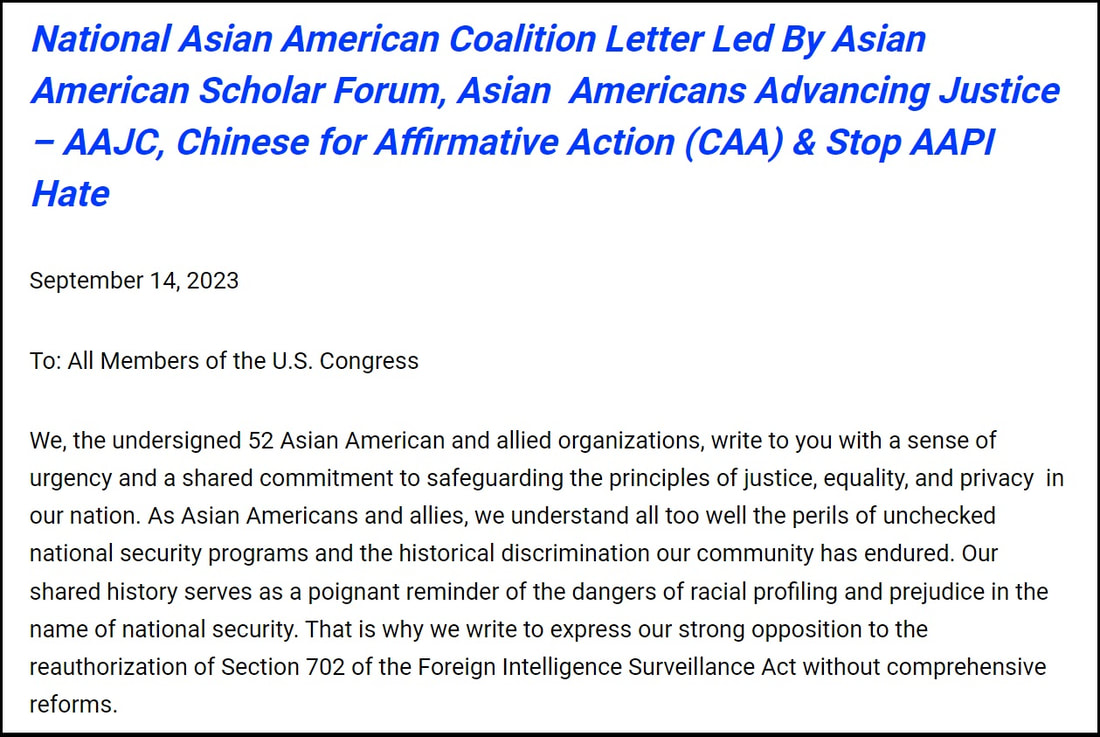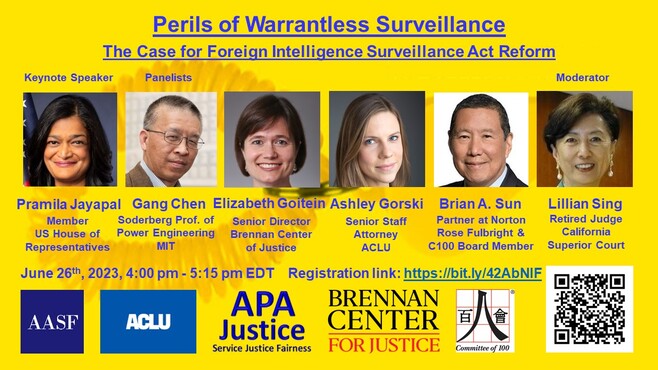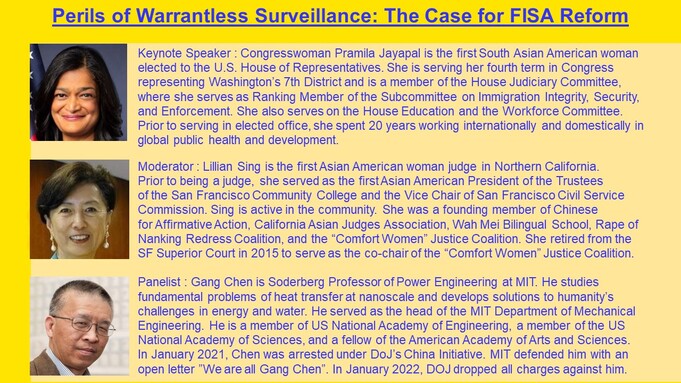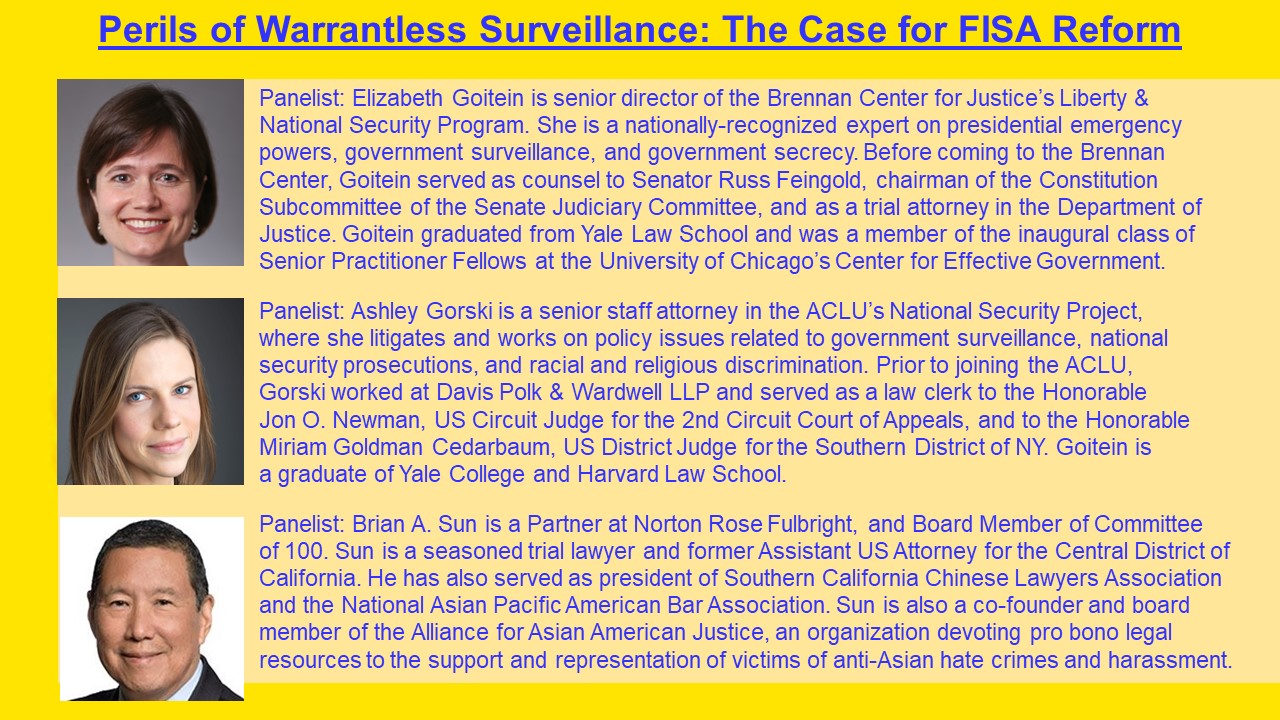|
On September 14, 2023, a coalition of 52 Asian American organizations wrote to Congress to oppose the renewal of Section 702 of the Foreign Intelligence Surveillance Act (FISA) unless significant revisions are put into place. The letter, led by Asian American Scholae Forum (AASF), Advancing Justice | AAJC, and Chinese for Affirmative Action (CAA) and Stop AAPI Hate, wrote "with a sense of urgency and a shared commitment to safeguarding the principles of justice, equality, and privacy in our nation. As Asian Americans and allies, we understand all too well the perils of unchecked national security programs and the historical discrimination our community has endured. Our shared history serves as a poignant reminder of the dangers of racial profiling and prejudice in the name of national security. That is why we write to express our strong opposition to the reauthorization of Section 702 of the Foreign Intelligence Surveillance Act without comprehensive reforms."
|
References and Links
2024/02/14 Washington Post opinion: I was head of the NSA. In a world of threats, this is my biggest worry
2024/02/13 The Hill: Freedom Caucus pushes for warrant amendment to new FISA bill
2024/02/12 The Hill: House unveils new warrantless surveillance bill
2023/12/14 The Hill: Congress approves short-term extension of warrantless surveillance powers
2023/09/14 Washington Post: Cybersecurity 202
2023/09/14 AASF/AAJC/CAA: Coalition Letter Opposing Reauthorization of Section 702 of FISA Without Comprehensive Reforms
2024/02/14 Washington Post opinion: I was head of the NSA. In a world of threats, this is my biggest worry
2024/02/13 The Hill: Freedom Caucus pushes for warrant amendment to new FISA bill
2024/02/12 The Hill: House unveils new warrantless surveillance bill
2023/12/14 The Hill: Congress approves short-term extension of warrantless surveillance powers
2023/09/14 Washington Post: Cybersecurity 202
2023/09/14 AASF/AAJC/CAA: Coalition Letter Opposing Reauthorization of Section 702 of FISA Without Comprehensive Reforms
|
EVENT TITLE: Perils of Warrantless Surveillance: The Case for Foreign Intelligence Surveillance Act Reform
WHEN: June 26, 2023, 4 pm ET/ 1 pm PT WHAT: Online Webinar REGISTRATION: https://bit.ly/42AbNIF HOSTS:
Keynote Speaker: Pramila Jayapal, Member, U.S. House of Representatives Moderator: Lillian Sing, Judge (retired), California Superior Court Panelists:
DESCRIPTION: The U.S. Constitution protects its people against unreasonable searches and seizures. However, under Section 702 of the Foreign Intelligence Surveillance Act (FISA), the U.S. government engages in mass, warrantless surveillance of phone calls, text messages, emails, and other electronic communications between Americans and foreigners. Information collected under this law without a warrant can be used to prosecute and imprison people, even for crimes that have nothing to do with national security. Asian Americans, especially Chinese Americans and the immigrant and scientific communities, have been targeted for warrantless surveillance that led to wrongful and unjust prosecutions. They include Temple University Professor Xiaoxing Xi and possibly New York Police Department Officer Baimadajie Angwang. The current authorization of Section 702 will expire on December 31, 2023. What should the Asian American and immigrant communities know about Section 702? If it is not sunset, what reforms will be needed? What are the next steps for the communities? |
References and Links
2023/06/13 Washington Post: National security officials make case for keeping surveillance powers
2023/06/06 Cato Institute Open Policy Forum: Surveillance Reform Prospects
2023/05/19 New York Times: F.B.I. Violated Surveillance Program Rules After George Floyd Protests and Jan. 6 Attack
Washington Post: FBI misused surveillance tool on Jan. 6 suspects, BLM arrestees and others
AP News: FBI broke rules in scouring foreign intelligence on Jan. 6 riot, racial justice protests, court says
Washington Post: What’s the database the FBI misused to seek info on Jan. 6 suspects, BLM arrestees?
2023/05/15 Louisiana House of Representatives: HB537 hearing starts at around 1:40:10 (video 3:34:11 Abigail Hu testimony starts at 3:12:45))
2023/05/01 Center for Democracy and Technology: There Is No “Defensive Search” Exception to the Fourth Amendment: Why a Consistent Warrant Rule Is Necessary to Fix FISA Section 702
2023/04/27 Privacy and Civil Liberties Oversight Board: Statement of Chair Sharon Bradford Franklin on “Fixing FISA: How a Law Designed to Protect Americans Has Been Weaponized Against Them”
Roll Call: Congress starts work on renewal of controversial surveillance law
2023/04/12 Lawfare: A Brief History of Programmatic Collection Pre-Section 702
2023/03/17 Congressional Research Service: Reauthorization of Title VII of the Foreign Intelligence Surveillance Act
2023/03/10 Brennan Center: Coalition Document Proposes Reforms to Section 702
4-Page Overview
2023/03/05 Project On Government Oversight: History Shows Congress Can Sunset Section 702
2023/02/27 New York Times: Security Agencies and Congress Brace for Fight Over Expiring Surveillance Law
2023/02/23 Electronic Privacy Information Center: Reforming 702: End Warrantless Backdoor Searches
2023/02/13 Just Security: The Year of Section 702 Reform, Part I: Backdoor Searches
2023/02/10 Demand Progress: FBI Unlawfully Used Congressman’s Name to Fish Through Warrantlessly Surveilled Communications
2023/02/09 Lawfare: If Congress Wants to Protect Section 702, It Needs to Rein in the FBI
2022/09/30 ACLU: Xi v. United States – Challenge to Warrantless Surveillance
2021/12/10: APA Justice: APA FISA Watch Website (via Wayback Machine)
ACLU: Warrantless Surveillance Under Section 702 of FISA
Electronic Frontier Foundation: Decoding 702: What is Section 702?
2023/06/06 Cato Institute Open Policy Forum: Surveillance Reform Prospects
2023/05/19 New York Times: F.B.I. Violated Surveillance Program Rules After George Floyd Protests and Jan. 6 Attack
Washington Post: FBI misused surveillance tool on Jan. 6 suspects, BLM arrestees and others
AP News: FBI broke rules in scouring foreign intelligence on Jan. 6 riot, racial justice protests, court says
Washington Post: What’s the database the FBI misused to seek info on Jan. 6 suspects, BLM arrestees?
2023/05/15 Louisiana House of Representatives: HB537 hearing starts at around 1:40:10 (video 3:34:11 Abigail Hu testimony starts at 3:12:45))
2023/05/01 Center for Democracy and Technology: There Is No “Defensive Search” Exception to the Fourth Amendment: Why a Consistent Warrant Rule Is Necessary to Fix FISA Section 702
2023/04/27 Privacy and Civil Liberties Oversight Board: Statement of Chair Sharon Bradford Franklin on “Fixing FISA: How a Law Designed to Protect Americans Has Been Weaponized Against Them”
Roll Call: Congress starts work on renewal of controversial surveillance law
2023/04/12 Lawfare: A Brief History of Programmatic Collection Pre-Section 702
2023/03/17 Congressional Research Service: Reauthorization of Title VII of the Foreign Intelligence Surveillance Act
2023/03/10 Brennan Center: Coalition Document Proposes Reforms to Section 702
4-Page Overview
2023/03/05 Project On Government Oversight: History Shows Congress Can Sunset Section 702
2023/02/27 New York Times: Security Agencies and Congress Brace for Fight Over Expiring Surveillance Law
2023/02/23 Electronic Privacy Information Center: Reforming 702: End Warrantless Backdoor Searches
2023/02/13 Just Security: The Year of Section 702 Reform, Part I: Backdoor Searches
2023/02/10 Demand Progress: FBI Unlawfully Used Congressman’s Name to Fish Through Warrantlessly Surveilled Communications
2023/02/09 Lawfare: If Congress Wants to Protect Section 702, It Needs to Rein in the FBI
2022/09/30 ACLU: Xi v. United States – Challenge to Warrantless Surveillance
2021/12/10: APA Justice: APA FISA Watch Website (via Wayback Machine)
ACLU: Warrantless Surveillance Under Section 702 of FISA
Electronic Frontier Foundation: Decoding 702: What is Section 702?

The U.S. Constitution protects its people against unreasonable searches and seizures.
Under Section 702 of the Foreign Intelligence Surveillance Act (FISA), the U.S. government engages in mass, warrantless surveillance of Americans’ and foreigners’ phone calls, text messages, emails, and other electronic communications. Information collected under the law without a warrant can be used to prosecute and imprison people, even for crimes that have nothing to do with national security. Given our nation’s history of abusing its surveillance authorities, and the secrecy surrounding the program, we should be concerned that Section 702 is and will be used to disproportionately target disfavored groups, whether minority communities, political activists, or even journalists.
The ACLU represents Xiaoxing Xi, a Chinese-American physics professor at Temple University, who is suing the government over its dismissed prosecution of him for supposedly sharing sensitive technology with scientists in China. The lawsuit, filed in 2017, challenges the FBI’s baseless arrest of Xi and its surveillance methods as well as its discriminatory targeting of Chinese-American scientists.
New York Police Department Officer Baimadajie Angwang reportedly also fell victim to Section 702 warrantless surveillance under the now-defunct "China Initiative."
The current authorization of Section 702 will expire on December 31, 2023.
Under Section 702 of the Foreign Intelligence Surveillance Act (FISA), the U.S. government engages in mass, warrantless surveillance of Americans’ and foreigners’ phone calls, text messages, emails, and other electronic communications. Information collected under the law without a warrant can be used to prosecute and imprison people, even for crimes that have nothing to do with national security. Given our nation’s history of abusing its surveillance authorities, and the secrecy surrounding the program, we should be concerned that Section 702 is and will be used to disproportionately target disfavored groups, whether minority communities, political activists, or even journalists.
The ACLU represents Xiaoxing Xi, a Chinese-American physics professor at Temple University, who is suing the government over its dismissed prosecution of him for supposedly sharing sensitive technology with scientists in China. The lawsuit, filed in 2017, challenges the FBI’s baseless arrest of Xi and its surveillance methods as well as its discriminatory targeting of Chinese-American scientists.
New York Police Department Officer Baimadajie Angwang reportedly also fell victim to Section 702 warrantless surveillance under the now-defunct "China Initiative."
The current authorization of Section 702 will expire on December 31, 2023.
The Foreign Intelligence Surveillance Act
Growing out of the Watergate scandal when federal resources were used to spy on domestic political and activist groups, The Foreign Intelligence Surveillance Act (FISA) was introduced by Senator Ted Kennedy (D-MA) and signed into law by President Jimmy Carter in 1978. As its title suggests, the law was created to “provide judicial and congressional oversight of the government’s covert surveillance activities of foreign entities and individuals in the U.S., while maintaining the secrecy needed to protect national security.”
Soon after the 9/11 terrorist attacks in 2001, the George W. Bush Administration began a series of questionable secret surveillance practices, including warrantless domestic wiretapping. Major amendments to FISA were subsequently made to legitimize and empower some of these secret operations. FISA was transformed into massive warrantless surveillance programs shrouded in secrecy, and Chinese Americans are disproportionately impacted.
The FISA Amendments Act of 2008
The FISA Amendments Act of 2008 was enacted in 2008. It added a new Title VII to FISA, authorizing targeting of non-U.S. persons outside the U.S.. Section 702 spells out additional limitations to such surveillance. It was specifically stated that the surveillance must be conducted in a manner consistent with the Fourth Amendment to the United States Constitution.
Reauthorization of the FISA Amendments Act in 2012 and 2017
President Barack Obama reauthorized the FISA Amendments Act in 2012 for five years before Edward Snowden made astonishing disclosures in 2013 about how the government manipulates its power to conduct secret, warrantless mass surveillance programs on U.S. persons in violation of their constitutional rights. Some of the subsequently known problems such as “about communications,” “backdoor searches,” “parallel construction” and “reverse target” are described in the blog titled “One Asian American’s Perspective on the FISA Amendments Act and Section 702.”
President Trump signed the FISA Amendments Reauthorization Act of 2017 into law. The current authorization will expire on December 31, 2023.
Asian Americans Are Disproportionately Impacted
No person of Chinese origin was known to be part of the 9/11 or other terrorist attacks. Section 702 has always been claimed to be a vital tool to combat terrorism since 2008. However, soon after Section 702 became law, the Department of Justice (DOJ) and the Federal Bureau of Investigations (FBI) declared that economic espionage is a major security threat to the U.S. and started publicity campaigns with China as the major culprit.
In May 2017, the Committee of 100 presented a white paper, “Prosecuting ‘Chinese Spies’: An Empirical Analysis of the Economic Espionage Act” by legal scholar Andrew Kim of South Texas College of Law. Among other disturbing findings, the study showed an immediate spike in prosecutions against Asian Americans in 2008. A series of innocent naturalized Chinese Americans in private industry, federal government, and academia were accused of spying for China, but all of them were subsequently dismissed without an explanation, much less an apology, from the government.
Professor Xiaoxing Xi, former Interim Chair of the Physics Department at Temple University was also wrongfully prosecuted and eventually dismissed as an economic spy for China. He filed suit against FBI agent(s) for falsification of evidence and violations of his Fourth Amendment rights in May 2017, identifying FISA surveillance as a major contributing factor to the violations he faced. He was joined by his family and the American Civil Liberties Union
Despite the heroic efforts of individuals to defend themselves against all odds, they and their families have already suffered devastating damages in legal expense, emotional trauma, and overall reputation.
During the last reauthorization cycle in 2017, APA Justice set up a website APA FISA Watch to track the actions undertaken by the APA Justice Task Force and concerned organizations. They can be viewed via the Wayback Machine: https://bit.ly/3M1smH1
The Warrantless Surveillance Programs under FISA Present Serious Constitutional Issue
When the FISA Amendments Act was last due for reauthorization in 2012, little was known about the warrantless, mass surveillance programs because they were shrouded in secrecy. Today, we know that even the FISA court had sharply criticized in its written opinion (declassified in April 2017) that the government reporting efforts were lacking in “institutional candor” and represent “a very serious Fourth Amendment issue.” This same FISA court has approved more than 99.5% of the government’s requests since the enactment of FISA in 1978.
FISA and its amendments are not the only laws subject to misuse and abuse by the authorities in the name of national security. The magnitude of their adverse implication and impact has been difficult to assess due to the inherent secrecy and complexity.
With what little that has been made public, we know that protection for privacy and civil liberty has been grossly inadequate under FISA and its amendments. The government must not continue to use innocent, law-abiding Asian Americans as “collateral damage,” convenient scapegoats, or targets of racial profiling without accountability.
“Traditional” FISA, which requires lengthy applications to the secret FISA court, was used in fewer than 500 cases last year. Section 702, which doesn’t require individual court orders, can cover orders of magnitude more targets: more than 230,000 in 2021.



